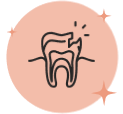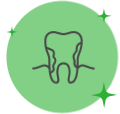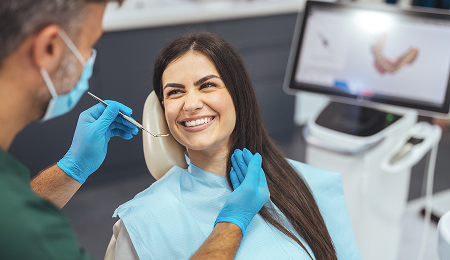Find out why you should talk to your dentist about menopause. Check out our 2025 Menopause and Oral Health Report.
Matters of the mouth
A shocking 84% of women 50+ don’t know how menopause affects their oral health. It’s time we started talking about it, and Delta Dental is leading the conversation. By understanding the link between menopause and oral health, women can help improve their oral and overall health.
Menopause affects the whole body, including the mouth. But it’s still something many women hesitate to talk about, even with their doctors or dentists. That silence can make it harder to get the right care at the right time. That’s why we created our annual Menopause and Oral Health Report: to shine a light on how menopause impacts oral health and to start more open conversations between women and their healthcare teams. Preventive care, like extra cleanings, can make a real difference in easing common menopause-related symptoms such as dry mouth or gum recession, sometimes called “menopause mouth.”
Why menopause? To quote Sarah Chavarria, CEO Delta Dental, “At Delta Dental, we believe that the impact of menopause on oral health should be an integral part of the broader dialogue, helping women maintain their well-being and holistic health during this life milestone.”
Menopause: An evolving conversation
An initiative that started as a single survey to understand menopause-related health issues in women back in 2023, has grown into an annual study that uncovered crucial information about insights and attitudes towards the menopause-oral health connection.
2025 |
Bridging the gap: Bringing menopause to the dental chair |
2024 |
Breaking the silence: Menopause and its effect on oral health |
2023 |
Breaking the stigma: Let’s talk about menopause and oral health |
-
-
Breaking the silence and barriers, all at once
Menopause isn’t just about mood swings and hot flashes. Dry mouth, receding gum line, tooth decay, a tingling feeling in the mouth may all be signs you’re nearing or experiencing menopause.
Delta Dental is helping spotlight the oral health-menopause connection in the documentary, “The (M) Factor: Shredding the Silence on Menopause,” which premiered on PBS in October 2024. Watch this special edit of the film for a perspective on how menopause impacts women’s oral health.
How does menopause affect teeth and gums?
Our teeth and gums inevitably change as we get older, but women in particular, experience aging differently as a result of the hormonal changes that happen during this stage. As estrogen levels drop, a few things start to change in your mouth.

Dry mouth
1 in 3 women over 50 experience dry mouth, raising the risk of cavities, gum disease and oral infections.

Gum disease
87% of women don’t know menopause is linked to gum disease, though early care can help prevent it.

Tooth loss
The combined effects of gum disease and reduced jawbone density can increase the risk of tooth loss.

Receding gumline
1 in 3 women over 50 report receding gums, which can expose roots and increase sensitivity.

Tooth decay
Less estrogen means less saliva, leaving teeth more vulnerable to decay and gum disease.
Source: 2023 Menopause Survey
Bringing menopause-related conversations to your dentist
Only 2% of women 50+ state they have discussed their menopause concerns with their dentists. However, 70% of women 50 and older say they have noticed at least one of the oral symptoms of menopause like dry mouth, receding gumlines and tooth sensitivity.
The challenge with finding good information
Many women over 50 run into roadblocks accessing reliable information about menopause and its impact on oral health. With so little out there, many women are turning to the internet more often than their health care providers to get the answers they need. This shows a real gap in the information being provided by professionals.
-

45% of women 40+ say common oral health symptoms — including tooth pain, dry mouth or gum inflammation — negatively impact their confidence, mood or mental health.
-

Most women 40+ say they are unaware of how symptoms like dry mouth, tooth sensitivity and gum changes are connected to menopause.
Improving outcomes through awareness
54% women planned to spend more time on their oral care routine after learning about the connection.
Empowering women with the right knowledge about menopause, oral health and oral care is an important part of promoting healthy aging. By offering menopause-specific benefits to our

68% of women 40+ would discuss menopause’s oral health impact with their dentist if they had menopause-specific dental benefits.

81% of dentists say they would be more inclined to proactively discuss the topic of menopause with a female patient during a dental visit if the patient were using a menopause-specific oral health benefit.

More than 4-in-5 women aged 40+ say they would be more likely to stay on top of their oral care if they had access to additional dental benefits.
Source: 2025 Menopause Survey
Quiz: How much do you know about menopause and oral health?
Hot flashes aren’t the only symptom of menopause — the hormonal shift can also impact your mouth. Yet, most women don’t realize there is a connection, even though nearly half of those surveyed say they have experienced common oral health symptoms in recent months, including heightened tooth sensitivity and changes to taste.
Test your knowledge about menopause and oral health with our quick interactive quiz to discover how hormonal changes can impact your gums, teeth and overall health.
Additional resources to protect your mouth through every stage of life
At Delta Dental, we’re committed to helping women embrace life’s next chapter. Check out these resources and empower yourself with the tools you need to navigate menopause confidently.

How to talk to your dentist about menopause (with email template)
This resource provides practical advice on how to have an open conversation with your dentist about menopause and oral health. It even includes an email template to help you get started.

The transitional stage of perimenopause can impact your oral health. Understand what to expect as you approach menopause and how to maintain your dental health.

Your oral health needs may continue to evolve after menopause. This resource discusses the ongoing effects of reduced estrogen levels on teeth and gums and offers tips for maintaining good oral hygiene as you age.
Jul 09, 2025
Bleeding Gums, Cavities, Dry Mouth, and More
Sure, we know that menopause is behind night sweats and hot flashes, but is it to blame for everything that goes awry when you’re over a certain age?
September 5, 2024
How Women’s Dental Health Changes as We Age
Most of us are aware (in theory) that a good dental hygiene routine includes regular brushing, consistent flossing, and a biannual checkup.
Jul 3, 2024
6 Surprising Menopause Symptoms Your Dentist Can Spot (Even at a Regular Cleaning)
Discover the top menopause mouth symptoms, from cold sores to dry mouth and more, and how to treat them, according to a dentist.
